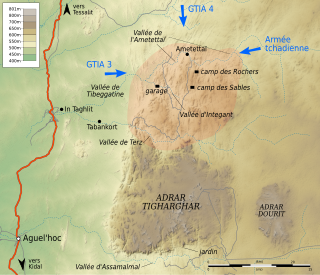
The Battle of Ifoghas, also known as the Battle of Tigharghâr or the Battle of the Ametettai, took place from 18 February to 31 March 2013, during the Northern Mali conflict. The French army and the Chadian army fought armed Salafist jihadist groups led by Al Qaeda in the Islamic Maghreb and Ansar Dine. After being defeated in January in the Battle of Konna and the Battle of Diabaly, the jihadists abandoned Timbuktu and retreated into the Adrar Tigharghar, a mountain of the Adrar of Ifoghas in northeastern Mali, which has been their sanctuary for years. The French started quickly a pursuit, and they took control of the towns of Tessalit and Aguelhok and begun the operation Panther in the Tigharghar. The first clashes erupt on February 18 and are mainly concentrated in the Ametettai Valley. It is caught between two armored columns, one French to the west and another Chadian to the east, while the paratroopers manage to surprise the jihadists by attacking on foot from the north. The valley is taken on March 3 and jihadists begin to gradually abandon the Tigharghar. Excavation missions and some skirmishes, however, continue to take place the following days. The operations cease on March 31. The battle was a turning point in the war, as with the capture of the Tigharghar, the jihadists lose their main sanctuary in the Sahel as well as most of their military arsenal, taken from the Malian army or Libya.

The Battle of Diabaly was fought between government forces of Mali, against groups of Islamists militants such as the AQIM and Ansar Dine. The Islamists held control of Diabaly for no longer than a week until Malian forces with the help French air strikes recaptured the town.
The Katibat Macina, also known as the Macina Liberation Movement or Macina Liberation Front, is a militant Islamist group that operates in Mali. It is an affiliate of Ansar Dine.
The first battle of Kidal took place during the Mali war. On 30 March 2012, the city was captured by rebel MNLA and Ansar Dine forces.

Amadou Koufa, nom de guerre of Amadou Diallo, also spelled Hamadoun Kouffa or Amadou Kouffa is a Malian Fulani jihadist and preacher who founded Katiba Macina, later part of Jama'at Nasr al-Islam wal Muslimin.

An Islamist insurgency has been ongoing in the Sahel region of West Africa since the 2011 Arab Spring. In particular, the intensive conflict in the three countries of Mali, Niger and Burkina Faso has been referred to as the Sahel War.
Between October 16 and 17, 2018, joint Franco-Malian forces clashed with Jama'at Nasr al-Islam wal Muslimin in a forest near Ndaki, Mali.
On March 5, 2017, jihadists from Jama'at Nasr al-Islam wal Muslimin attacked Malian forces in Boulikessi. The attack was the first by JNIM since its inception that month.
On 13 October 2016, jihadists from Ansar Dine ambushed Malian soldiers near Goumakoura, Mali.
On May 29, 2016, Katiba Macina militants ambushed Togolese peacekeepers in MINUSMA near Sévaré, Mali. The attack was the first deadly attack against UN peacekeepers in Mopti Region during the Mali War, and the first major engagement involving Togolese peacekeepers during the war.
The National Alliance for the Protection of Fulani Identity and the Restoration of Justice (ANSIPRJ) was a Fulani nationalist political and military movement formed on June 21, 2016, during the Mali War.
On January 15, 2016, unknown militants ambushed Malian forces near Wanna, in Goundam Cercle, Mali.
Between December 24–25, 2015, Ansar Dine militants attacked National Movement for the Liberation of Azawad (MNLA) positions in Talahandak, Mali. Ansar Dine captured the MNLA outpost, and then ambushed CMA reinforcements.
On October 28, 2015, a battle broke out in Tiébanda, Mali, between Katiba Macina militants and Malian forces.
On August 3, 2015, jihadists from Al-Qaeda in the Islamic Maghreb (AQIM) launched an attack on Malian forces in Gourma-Rharous, Mali. Eleven Malian soldiers were killed in the attack.
On August 7, 2015, jihadists from Al-Mourabitoun and Katiba Macina attacked the Byblos Hotel in Sévaré, Mali. The attack was one of the largest attacks against civilians in Mopti Region during the Mali War, and led to the deaths of thirteen people, including five civilians.
On July 16, 2015, the Malian army raided a jihadist base in the Sama Forest, in southern Mali's Sikasso Region. The raid is one of the few confrontations between jihadists and the Malian army in southern Mali, and marked the end of the Khalid ibn Walid katiba and jihadist expansion in southern Mali.
On July 2, 2015, a MINUSMA convoy was ambushed by jihadists affiliated with Al-Qaeda in the Islamic Maghreb en route from Goundam to Timbuktu.
Mahmoud Barry, nom de guerre Abou Yehiya, is a Malian jihadist and second-in-command of Katiba Macina. Since 2022 he has been the spokesperson of Jama'at Nasr al-Islam wal Muslimin.
On May 11, 2015, a Malian convoy was ambushed by Coordination of Azawad Movements (CMA) fighters in Tin Telout, Tombouctou Region, Mali. The ambush was the last conflict between the Malian government and CMA before the signing of the Algiers Accords.



